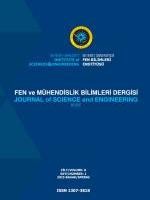İŞÇİ SAĞLIĞI VE İŞ GÜVENLİĞİ (İSİG) SİSTEMİNİN İNŞAAT UYGULAMA İŞ PROGRAMINA ENTEGRASYONU
İş Güvenliği, süresel planlama, entegre yönetim, proje yönetimi, işçi sağlığı ve iş güvenliği, iş programı
___
- [1] ILO, ILO Yıllık Raporu (12.05.2009) http://www.microinsurancefacility.org/ckfinder/userfiles/files/annualreport2009_en.pdf (Erişim Tarihi: 09.05.2018).
- [2] Duman E., Hamzaoğlu O., (2011, Aralık). İstanbul’da bir şantiyede çalışanların iş kazaları. İşçi Sağlığı ve İş Güvenliği Kongresi, s.2-4.
- [3] Bilir, S., Gürcanli,G.E., (2018). A Method For Determination of Accident Probability in Construction Industry, Teknik Dergi , 29/4.
- [4] Zou, P., X.,W., Sunindijo, R., Y., (2013). Skills for managing safety risk, implementing safety task, and developing positive safety climate in construction project, Automation in Construction, 34, s.92-100.
- [5] M.Sevim, G.E. Gurcanli, S.Bilir, (2015). Activity Based Risk Assessment and Safety Cost Estimation For Residential Building Construction Projects, Safety Science, No. 80, s. 1-12.
- [6] Bernardo, M., Casadesus, M., Karapetrovic, S. & Heras, I. (2009). How integrated are environmental, quality and other standardized management systems? An empirical study, Journal of Cleaner Production 17(8), s.742–750.
- [7] Stanton, W., and Willenbrock, J. (1990). Conceptual framework for computer-based construction safety control, J. Constr. Engrg. And Mgmt., ASCE, 116(3), s.383-398.
- [8] Loosemore, M., Andonakis, N., (2007). Barriers to implementing OHS reforms – the experience of small subcontractors in the Australian construction industry, International Journal of Project Management 25, s.579–588.
- [9] Yi, J., Kim Y., Kim K., Koo B. (2012) A suggested color scheme for reducing perception-related accidents on construction work sites. Accident Analysis and Prevention, 48, s.185-192.
- [10] Tozer K.D., Çelik,T., Gürcanli G.E., (2018, Mart). Classification of Construction Accidents in Northern Cyprus, Technical Journal, Vol. 29, No. 2, ISSN: 10.18400/tekderg.325546, Chamber of Civil Engineers.
- [11] http://www.gorkemerdogan.com/documents/iso_45001.pdf
- [12] Esmaeili B., M.Hallowell, (2013). Integration of safety risk data with highway construction schedules, Construction Management and Economics, Vol. 31, No. 6, s.528–541.
- [13] Bernardo, M., Casadesus, M., Karapetrovic, S., Heras, I. (2009). How integrated are environmental, quality and other standardized management systems? An empirical study, Journal of Cleaner Production, 17(8) ,s742–750.
- [14] S. Abrahamsson, R. Isaksson, and J. Hansson, (2010). Integrated Management Systems : advantages, problems and possibilities”, 13th Toulon-Verona Conference : Organizational Excellence in Service, s. 1–12.
- [15] Tarrants, W.E., (1980). The Measurement of Safety Performance, Garland STPM Press, New York.
- [16] Stanton, W., and Willenbrock, J. (1990). Conceptual framework for computer-based construction safety control. J. Constr. Engrg. And Mgmt., ASCE, 116(3),s.383-398.
- [17] Levitt, R., and Kartam, N. (1990). Expert systems in construction engineering and management: state of the art, Knowledge Engrg. Rev. J., 5(2), s.97-125.
- [18] Kartam, N. (1997) Integrating safety and health performance into construction CPM. ASCE Journal of Construction Engineering and Management, 123(2), 121–6.
- [19] Saurin, T.A., Lantelme, E. and Formoso, C.T. (2000). Contributions for NR-18 regulation review: Work Conditions and Environment in the Construction Industry – in Portuguese, PPGEC/UFRGS, Porto Alegre
- [20] Saurin, T.A., & Formoso, C.T., & Guimarares , L.B.M.,(2001), Integrating Safety into Production Planning and Control Process : An Explotary Study, In Proceedings of the 9th annual conference of the international group for lean construction, Singapore
- [21] Saurin, T.A. , Formoso, C.T. , Guimaraes, L.B. & Soares, A.C. (2002, Aug.). Safety and Production - An Integrated Planning and Control Model, 10th Annual Conference of the International Group for Lean Construction. Gramado, Brazil.
- [22] Althaqafi T., Elssy B., (2015,June), Integrating Occupational Health and Safety Systems into a Project Management System, International Journal of Research in Management & Business Studies (IJRMBS),s.35-38
- [23] Billy Hare, Iain Cameron, A. Roy Duff, (2006). Exploring the integration of health and safety with preconstruction planning, Engineering, Construction and Architectural Management, Vol. 13 Issue: 5, pp.438-450
- [24] Bowling, A. (2002). Research Methods in Health: Investigating Health and Health Services. Philadelphia, PA: McGraw-Hill House
- [25] Krueger, R. and Casey, M. (2000). Focus Groups: A Practical Guide for Applied Research. Third Edition. Thousand Oaks, CA: Sage Publications
- [26] Kitzinger, J. (1994). The methodology of focus groups: the importance of interaction between research participants, Sociology of Health and Illness, 16 (1), s.103–121.
- [27] Kitzinger, J. (1995). Qualitative research: introducing focus groups, British Medical Journal, 311, s.299–302
- [28] Neuman W L (2007) Toplumsal Araştırma Yöntemleri- Nicel ve Nitel Yaklaşımlar Cilt 2, Sedef Özge (çev), Yayınodası, İstanbul.
- [29] Kümbetoğlu, B (2005) Sosyolojide ve Antropolojide Niteliksel Yöntem ve Araştırma, Bağlam Yayınları, İstanbul
- [30] Hansen A, Cottle S., Negrine R., Newbold C., (1998) Mass Communication Research Methods, MacMillan Pres Ltd., Houndmills, Basingstoke, Hamphire and London.
- [31] Stokes J (2003) How to do Media and Cultural Studies, Sage Publications, London.
- [32] MacIntosh, J. (1981). Focus groups in distance nursing education, Journal of Advanced Nursing, 18 (12), 1981–1985
- [33] Gibbs, A. (1997). Focus groups”, Social Research Update, 19. http://sru.soc.surrey.ac.uk/SRU19.html. İndirme Tarihi: 10.08.2007.
- [34] Cheng Ching-Wu, Leu Sou-Sen, Lin Chen-Chung, Fan Chihhao, (2010) Characteristic Analysis of Occupational Accidents at Small Construction Enterprises, Safety Science 48, s.698–707
- [35] Gürcanlı, E. (2011). İnşaatlarda Tasarım Yoluyla İş Güvenliği. Türkiye Mühendislik Haberleri, s.56-68
- ISSN: 1307-3818
- Başlangıç: 2007
- Yayıncı: Beykent Üniversitesi
CAM TOZUNUN BETON BASINÇ DAYANIMINA ETKİSİ
Mehmet UZUN, Mustafa Tolga ÇÖĞÜRCÜ, Ülkü Sultan KESKİN
TÜRKİYE’DE İNOVATİF BİR ÇATI KAPLAMA MALZEMESİ GELİŞTİRİLMESİ SÜRECİ ÖNERİSİ
İŞÇİ SAĞLIĞI VE İŞ GÜVENLİĞİ (İSİG) SİSTEMİNİN İNŞAAT UYGULAMA İŞ PROGRAMINA ENTEGRASYONU
MERVE SEVIM, Gürkan Emre Gürcanlı
Bedia BATİ, İsmail ÇELİK, Neşe ERAY, Abdullah TURAN, Elif Ebru ALKAN
